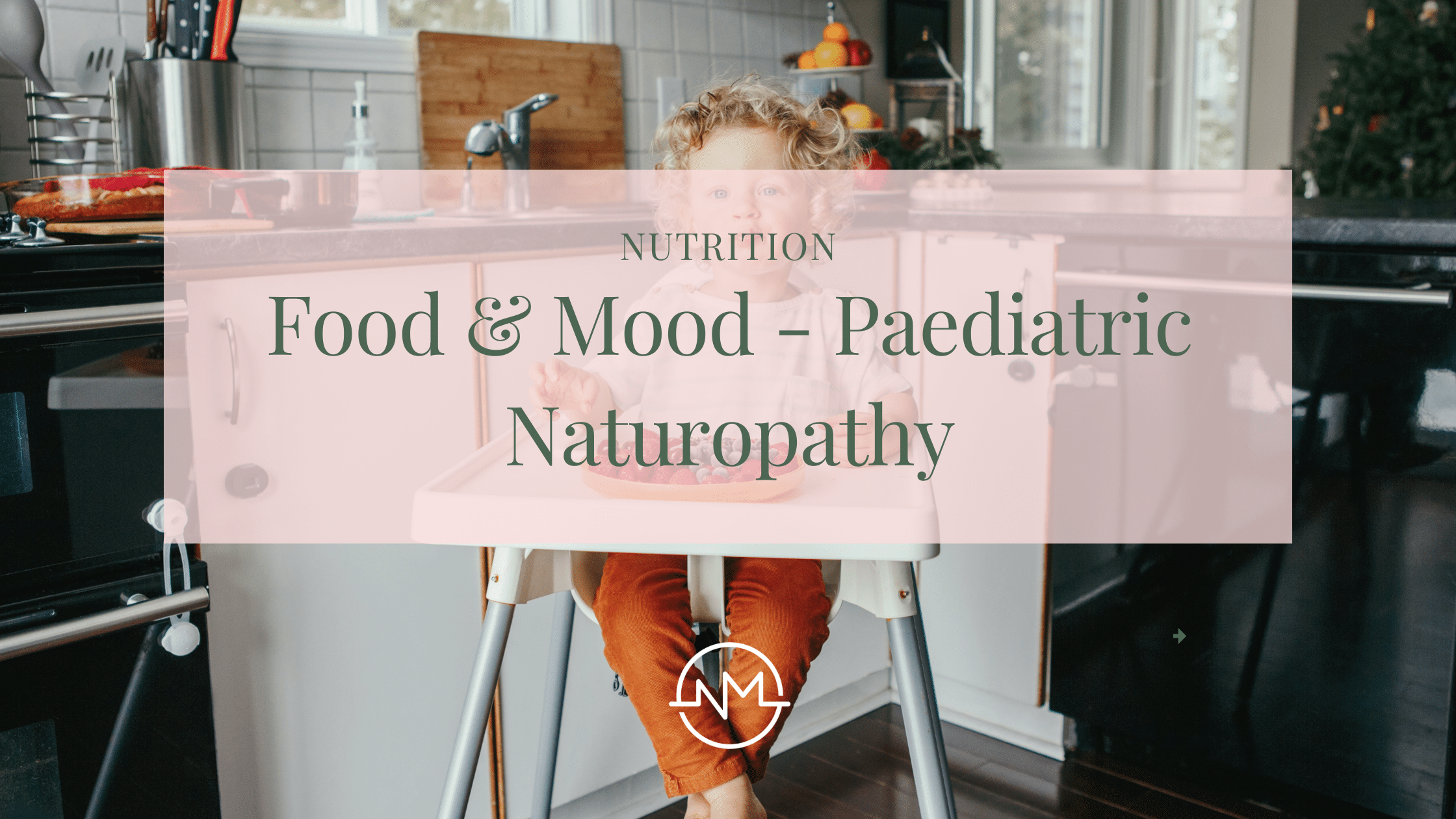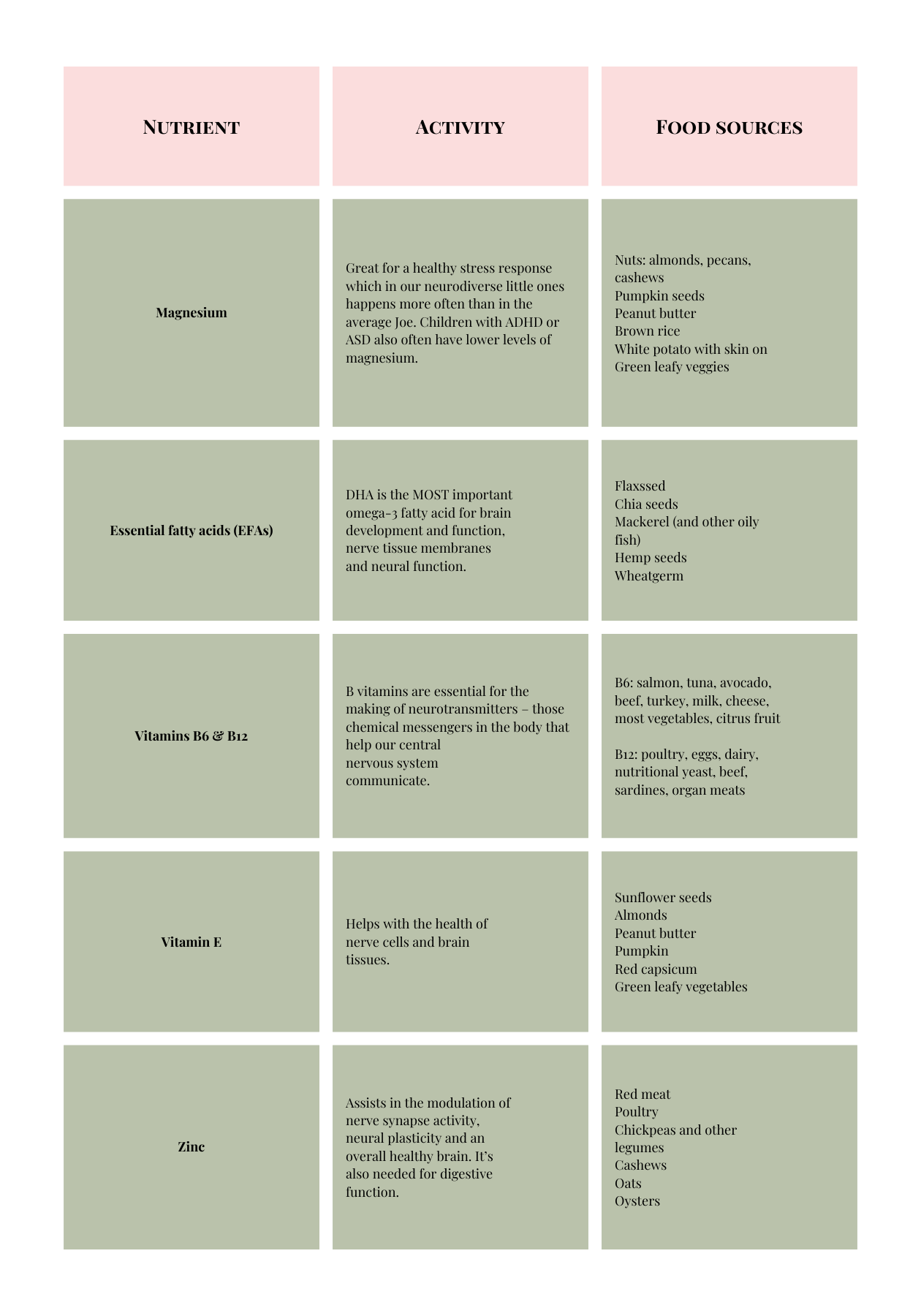
23 Sep Food & Mood — Paediatric Naturopathy
What we eat affects how our gut and brains work.
The human gut (enteric nervous system) and brain (central nervous system) talk to each other in bidirectional communication via the gut brain axis. If you imagine this two-way street like a super highway, you can imagine the importance of keeping traffic flowing happily in both directions. Many body processes, such as inflammation, oxidative stress (the product of too many free radicals in the body), and an imbalance of good-bad gut bacteria can influence the happy movement of this traffic, with diet being the main influencer.
There is increasing evidence supporting that nutrition and lifestyle chances can be supportive tools for neurodiverse people, including children. Many people with ADHD experience disrupted digestion, and a key focus of naturopathic treatment for ADHD is restoring balance to the gut microbiome. In this article, I explore some important nutritional and lifestyle factors contributing to mood and cognitive performance.
Nutritional & lifestyle factors affecting mood
Food is more than just a way of sustaining us. For many, food is a source of comfort — and for many parents, food is a “treat” or a “bribe” that we give our children. In every culture across the world, food is also a way of socialising. For parents of neurodiverse children, I stress the importance of the general “healthiness” of food. Diets high in refined sugar and saturated fat can increase the risk of impulsive behaviour and hyperactivity. Diets high in refined carbohydrates, sugars, salt, and total saturated fats also show a higher prevalence of ADHD core symptoms, as another study shows.
While we don’t know the causal relationship between diet and symptoms of ADHD and other neurodiveristies, science is consistently demonstrating a link between the severity of symptoms and the quality of the diet. This is why in paediatric naturopathy, we focus strongly on “food as medicine”, and dietary planning is an enormous part of our work with children.
Other important nutritional and lifestyle factors include:
- Balancing blood sugar
- Identifying food allergies, such as gluten and dairy
- Addressing nutritional deficiencies
- Ensuring optimal intake of essential fats, mainly Omega-3 fatty acids
The effects of food colouring

It was once an old wive’s tale that red cordial made children more hyperactive, but we now know this is less of an old wive’s tale and more of an acute observation of how food additives affect mood. For example, studies have shown that food colours and preservatives have negative effects on the behaviour of children with or without ADHD. The 6 most common food colours linked to hyperactivity in children are:
- E102 (tartrazine)
- E104 (quinoline yellow)
- E110 (sunset yellow FCF)
- E122 (azurobine or carmoisine)
- E124 (ponceau 4R)
- E129 (allure red)
These food colourings are used in a variety of processed foods, including soft drinks, sweets, cakes, and ice cream. Reading food labels accurately is extremely important in identifying which foods contain colourings and preservatives. Supporting parents to learn how to read food labels is an essential part of paediatric naturopathy, especially in the treatment of hyperactivity, ADHD, and other primary symptoms of neurodiversity.
Key focus areas for children’s nutrition
The easiest way to see how foods are affecting your children is to keep a food diary. This is the simple process of writing down the food/s eaten, the time of day they are consumed, and any behavioural changes noted within a certain time frame of consuming that food. A 5-7 day food diary will begin to reveal a pattern. With the help of a paediatric naturopath, GP, or paediatrician, you can begin to modify your child’s diet to accommodate the behavioural changes induced by certain foods.
It can be difficult to alter the diet of children with neurodiversity, and their diets are often more restrictive, with less fruits and vegetables and more fluffy carbohydrates such as bread, pizza, cake, and biscuits. The best general food advice is to try and create a diet containing good amounts of low GI carbohydrates (found in oats, lentils, rice, beans), and a balance of fruit and vegetables. This provides more nutritious carbohydrates that produce a steady source of energy. In the long term, this helps children with attention issues, brain fog, and other behavioural issues.
Here is a brief table that shows key nutrients to focus on to support your child, and the foods they can be found in.

It can be daunting understanding what foods to buy, how to meal prep, and how to have your child begin eating foods that they are unfamiliar with or simply not used to. When providing support to parents, I always provide a shopping list, recipes, and strategies for introducing new foods and replacing old ones. If you believe your little one needs nutritional support, or that you as a parent could benefit from understanding how food impacts your child’s mood, behaviour, and neurodiversity, book in to see me (Lynn Joels, NatMed’s Paediatric Naturopath) via the link below. I’m excited to help you get your family’s health back on track today.
